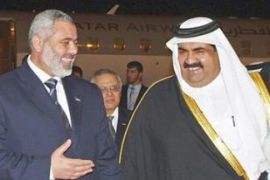UN: Palestinians need record aid
UN aid groups say there is a deepening Palestinian humanitarian crisis.

The Palestinian health care system is running out of medicine and on the verge of collapse and nearly 50 per cent of Palestinians do not have reliable access to food.
Staying afloat
But Samir Abu Aisha, the acting Palestinian finance minister, said on Wednesday that increased aid from Arab and European countries had allowed the government to stay afloat.
However, independent economists and analysts say the government is still in a deep crisis.
About three-quarters of the $453 million being requested is earmarked for job creation, cash assistance and food aid, Shearer said.
The UN is also asking for money to support the faltering health and education systems.
International boycott
Much of the economic damage stems from the international boycott that Israel and Western nations imposed on the Palestinian Authority after Hamas won parliamentary elections and took office in March.
The boycott has left the government unable to pay full salaries to its 165,000 workers, who make up the backbone of the Palestinian economy.
Shearer said that Israeli restrictions on exports from the Gaza Strip and increased restrictions on movement across the West Bank have also damaged the economy.
He said: “Coming on top of the problems with access of movement, [the economic boycott] has had a massive impact on poverty levels within the West Bank and Gaza.
“About a million people who have depended on a PA salary earner cannot do that anymore.”
‘Political settlement’
Shearer stressed that increased aid was not the solution to the Palestinian crisis.
He said: “While humanitarian aid can slow the deterioration, what is really needed is a political settlement to the issue.”
European countries have stepped up humanitarian aid, channeled through an international fund that bypasses Hamas.
Arab countries have sent hundreds of millions of dollars in aid, in most cases through the office of Mahmoud Abbas, the Palestinian president, who is from the Fatah party.
Tax revenues
Abu Aisha said the government has managed to give civil servants 59 per cent of their back pay.
He blamed the financial hardship still afflicting Palestinians not on the international boycott, but on Israel’s seizure of hundreds of millions of dollars in tax revenues.
That sum now equals $550 million, he said at a news conference in the West Bank city of Ramallah, “and could immediately solve the financial crisis if we receive it”.
Miri Eisin, an Israeli spokeswoman, said Israel would be willing to rethink its seizure of the tax funds if Galid Shalit, an Israeli soldier captured by Hamas-linked fighters in June, was released.
Breathing room
Abu Aisha said that Arab governments had upped their direct payments to the government from $20 million a month before Hamas came to power to $45 million.
He said that $60.5 million in cash had been carried into the Gaza Strip by Hamas officials returning from Egypt, and that the government would continue to use this tactic to circumvent the boycott.
He said: “We are going to keep going this way if Israel and the US don’t lift the embargo.”
He also noted that European aid to the Palestinians had increased by 27 per cent this year, but criticised the EU for bypassing the government and giving the money directly to civilians.
Hamas was optimistic after Ismail Haniya, the Hamas prime minister, received new pledges of aid during his trip abroad, including a promise from Qatar for $30 million a month to cover the salaries of teachers and some health workers.
Naser Abdel Karim, an economics professor at Bir Zeit university outside Ramallah, said the increased aid has blunted the pressure on Hamas and given the group some breathing room.